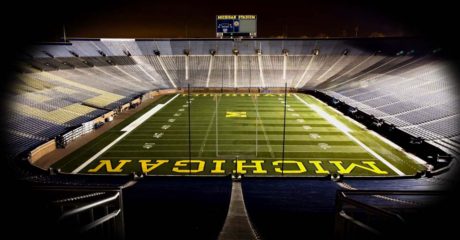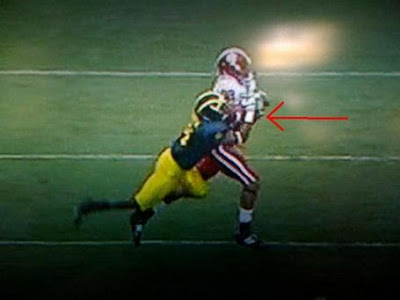Michigan 42, Indiana 35
 |
| You can close your eyes and pray all you want, #46, but you’re not gonna catch him. |
Yesterday’s victory was at once entertaining, frustrating, and boring. The entertainment factor was apparent: Michigan put up 574 yards and 42 points on a Big Ten team, with quarterback and Heisman frontrunner Denard Robinson accounting for 494 of those yards. The frustration part was apparent, too: Michigan allowed 568 yards and 35 points to a perennial Big Ten cellar dweller, and Indiana held the ball for over 41 minutes.
The boring part was less obvious, but throughout the entire game, I knew Michigan was going to win this game. I’ve rarely been this confident during a contest, but I feel I’ve reached a near level of zen when it comes to watching this Michigan team. Michigan’s offense will score loads of points as long as Denard Robinson is at the helm, and Michigan’s defense sucks. I no longer hope for competence from Michigan’s defense. They are overmatched and there’s virtually no hope for them to improve this season. Sure, they’ll make a timely sack once in awhile (Mike Martin) or flash some anticipation in the secondary that results in an interception (Cam Gordon). But ultimately, both defenses yesterday were atrocious and Michigan’s offense is better. A 7-point margin is . . . just about right.
Some praise and a few gripes . . .
Denard Robinson is awesome. I feel like I say this in almost every post, but there’s no getting around it. He is having one of the best statistical seasons in college football history and is currently on pace to run (2,353) and throw (2,621) for 2,000 yards and account for 39 touchdowns over a 13-game season. The easiest part of the schedule has passed, so I don’t expect that Robinson will maintain his torrid pace. Regardless, the first five starts of his career must be on par with or better than every other quarterback in NCAA history.
Michigan’s defense is bad. This was noted above, but there’s no reason to expect significant improvement in the second half of the season. I heard Michigan’s official motto is “Let’s hope the other team drops the ball or something.” After Saturday’s game Michigan is ranked #120 (out of 120 teams) in pass defense, giving up 307.8 yards a game in the air. Michigan is also #88 in sacks, #88 in net punting, #99 in punt returns, #102 in total defense, and #104 in kickoff returns. Basically, Michigan is bad at everything that doesn’t involve offense. And the Wolverines haven’t even played the tough part of their schedule.
Michigan’s goalline offense needs rethinking. Roy Roundtree caught a 74-yard pass that took the ball down to Indiana’s 2-yard line. On first down, Michigan lined up in the I-formation and shot a BB at Indiana’s defense in the form of 5’6″, 180 lb. Vincent Smith. That didn’t work. Then Michigan lined up in the I-formation again, and the center-quarterback exchange was promptly fumbled, providing Indiana the chance to drive 99 yards for a touchdown (on which Indiana capitalized). Rich Rodriguez has a 6’0″, 211 lb. tailback (Michael Cox) and a 6’1″, 227 lb. tailback (Stephen Hopkins) at his disposal. That personnel decision makes no sense whatsoever.
Vincent Smith had a good game. I don’t think anyone has been more critical of Vincent Smith than I have. It’s not that I dislike him or think he’s a horrible player, but I just think there are better options. Against Indiana he had a 56-yard touchdown run on which he was nearly untouched. Altogether he had 9 carries for 80 yards and the touchdown. After five games, here’s how Smith stacks up against the rest of the Big Ten’s (and Notre Dame’s) leading rushers, listed according to yards per carry:
1. Edwin Baker (Michigan State): 75 carries, 536 yards, 7.1 ypc, 5 TDs
2. John Clay (Wisconsin): 94 carries, 581 yards, 6.2 ypc, 6 TDs
3. Mikel Leshoure (Illinois): 77 carries, 478 yards, 6.2 ypc, 3 TDs
4. Dan Dierking (Purdue): 38 carries, 205 yards, 5.4 ypc, 2 TDs
5. Evan Royster (Penn State): 67 carries, 353 yards, 5.3 ypc, 1 TD
6. Adam Robinson (Iowa): 98 carries, 480 yards, 4.9 ypc, 6 TDs
7. Armando Allen (Notre Dame): 80 carries, 392 yards, 4.9 ypc, 2 TDs
8. Vincent Smith (Michigan): 53 carries, 252 yards, 4.8 ypc, 4 TDs
9. Dan Herron (Ohio State): 65 carries, 287 yards, 4.4 ypc, 5 TDs
10. Duane Bennett (Minnesota): 91 carries, 400 yards, 4.4 ypc, 2 TDs
For what it’s worth, prior to this week Smith was averaging 3.9 yards per carry, which would have put him at #11. Against varying levels of competition, Michael Shaw (5.6 ypc) would be #4, Stephen Hopkins (4.7 ypc) would be #9, and Michael Cox (9.3 ypc) would be #1. So there is some statistical backing for my argument that Michigan’s starting running back position needs to show some more productivity.
Indiana fans are tools. Unless something odd happened in the stadium that wasn’t caught on camera, it sure seemed like the fans in Bloomington cheered when Denard Robinson fell to the ground injured. On the one hand, it’s certainly a backhanded compliment, like “Hooray, we might have a chance to win this game if he sits out the rest of it!” On the other – and far more important – hand, it was a classless response from the Hoosier crowd. You don’t cheer when someone gets hurt, period.
Junior Hemingway is slow but good, I guess. Hemingway caught a slant from Denard Robinson that he turned into a 70-yard touchdown. After he broke the cornerback’s tackle and got up to full speed in the open field, I started wondering, “Did he pull a muscle?” Nope, that’s just how Hemingway runs. It was reminiscent of Roy Roundtree’s 76-yard catch against Illinois in 2009, on which Roundtree was run down by Terry Hawthorne. Luckily, Indiana’s defense isn’t very fast, either. Hemingway also made a clutch 42-yard reception near the end of regulation that set up Robinson’s game-winning touchdown, and finished with 3 catches for 126 yards and 1 touchdown.
Jordan Kovacs must hate Darius Willis. Last year Darius Willis outran Kovacs (among others) for an 85-yard touchdown. This year Willis caught a pass in the flat, shook Kovacs on the sideline, and trotted in for a touchdown. Kovacs is normally a sure tackler, but I have to admit, the thing that ran through my mind was “If he can’t tackle and he can’t run fast, why is he out there?” That was just a fleeting thought, though, because Kovacs is probably one of the better tacklers on the team.
Roy Roundtree should get the #1 jersey next year. Prior to the season, I predicted that Roundtree would get 60 catches and 900 yards this year. Through five games, he’s on pace for 65 catches and 876 yards, which is pretty darn close. If he continues in this vein, then I think he deserves to wear the #1 jersey in 2011. He’s a likeable, hardworking kid, he’s successful on both long and short passes, he’s a willing blocker, and he has a knack for getting open. He might not be the physical freak that Michigan is used to seeing out of its #1 wide receivers (6’3″, 215 lb. guys who can jump high and run really fast), but Michigan fans couldn’t ask for much more out of him.
Taylor Lewan better learn quickly. We’ve been hearing for months that Lewan is a bit of a hothead. His emotions could have cost Michigan the game on Saturday, though. After Denard Robinson scored a touchdown to put Michigan up 41-35 with 17 seconds left in the game, Lewan was trying to get over to Robinson to celebrate. Supposedly an Indiana player on the ground tried to trip Lewan, which resulted in an altercation and a 15-yard penalty on Lewan. I don’t care what an opponent tries to do – there’s no good excuse for getting a 15-yard penalty when your team scores the potential game-winning touchdown. If he trips you, fall to the ground, get up, and go celebrate. What, you’ve never been tripped before? Were you afraid that he ruined your pretty maize pants? Suck it up, and think about the team first. And while you’re at it, you might want to learn how to block without holding. On the game-winning drive, he should have been called for holding at least twice that I saw on television.
Michigan found a way to win. Regardless of what went down from the starting whistle to the final whistle, Michigan won the game. The offense was mostly awesome, and the defense did just enough to win. There are definitely some things to fix or tweak, but when it comes down to it, the Wolverines’ record is 5-0. Go Blue!




